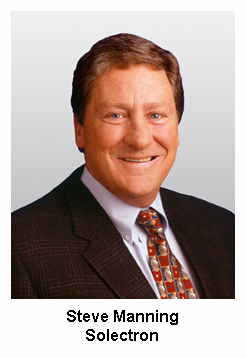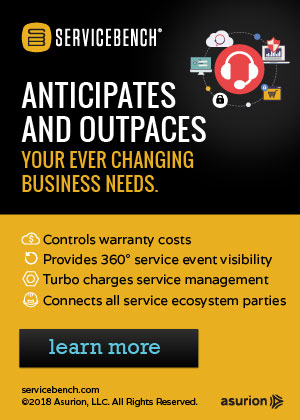Global Services:
Solectron helps major electronics companies design and manufacture their products, but in the future it sees a major opportunity to expand its operations in warranty repair and even recycling services.
Behind numerous computer, data communications, and mobile telephone companies stands an outsourcing company called Solectron Corp. Best known for its contract manufacturing of printed circuit boards for everything from servers to set-top boxes, it's increasingly becoming known for aftermarket warranty and repair services as well.
Solectron's Global Services business unit is still small in percentage terms, but is growing in importance for the future of the company. Steve Manning, vice president and general manager of Global Services, said the unit is now approaching 10% of the company's total revenue. In fiscal 2003, Global Services generated sales from continuing operations of $657 million, or 6% of the company's total net sales.
Manning said that some customers contract with Solectron for both manufacturing and aftermarket services. However, many aftermarket customers aren't using Solectron for contract manufacturing at all. "Close to 50% of our revenue comes from non-manufacturing customers," he said. |
 |
In-Store Support Services
For instance, Solectron currently provides roughly 2,000 technical staff members on an outsourcing basis to a mobile telephone operator. These employees of Solectron staff the unnamed carrier's storefronts and kiosks in shopping malls, where they provide the company's customers with training services, technical support, and light repairs.
"We don't do any hard soldering or anything -- simple parts replacements and firmware updates," Manning said. Anything more involved would go back to a central depot, which Solectron also runs. He said the in-store staff handles roughly seven out of every ten problems, while three out of ten require the escalation.
"It's a unique business model," Manning said of the outsourcing contract. "It's grown up over the last five or six years. When I first looked at it, I wasn't sure if it was a core competency we could perfect. But what I found was that this training and deployment engine is pretty powerful. We're looking at putting it into some other environments as well."
Right now Solectron is in around 60% of the carrier's storefronts, but in the coming weeks the companies will announce a nationwide rollout, Manning said. He said he'd prefer to not name the carrier until that time.
Solectron also is providing in-store services to Nokia for shops that Solectron owns and operates in Singapore and elsewhere in Asia. Its annual reports and press releases list Ericsson as a major customer along with equipment manufacturers such as Cisco Systems, Nortel Networks, Hewlett-Packard, Dell, IBM, Motorola, and others, but does not disclose the names of any wireless carriers.
Roughly 40% of the Global Services business unit's revenue comes from the computing, storage, and printing industry, Manning said. Another large chunk comes from the telecom, networking, and data communications equipment industry, which includes wireless. Then there's a small but growing involvement in consumer electronics, particularly with the newest families of digital entertainment products. For instance, Solectron provides warranty services for both the TiVo digital video recorders and the Microsoft Xbox gaming console. All repairs are initiated in a storefront or depot setting. Solectron does no dispatch services.
Warranty Work
Manning said roughly 80% of the unit's revenue comes from in-warranty services while the remaining 20% comes from repairs deemed to be outside of warranty coverage, such as customer abuse or accidental damage. He said roughly 85% of the activity is repair while 15% is replacement.
|
All costs are closely tracked, not only so Solectron can bill them back to its clients, but also so it can give them an accurate picture of their true warranty costs and the primary causes of their product failures. "Our clients are really challenged, as you know," Manning said. "Hardware prices are dropping a lot faster than warranty costs, so the expense-to-revenue ratio is getting out of balance for them. So we're working with them to not only have a lean service supply chain that we can project for them on a global basis, but also to reduce the failure rate itself." |
 |
Manning said the top priority is to reduce the No Trouble Found rate, currently around 30% to 35% across most of the product lines. However, some products such as the latest digital television recorders and some broadband equipment can generate NTF rates upwards of 60%, primarily because consumers have trouble understanding how they operate. One way to reduce the incidence of NTF, Manning said, is to accurately report the source and causes of these NTF reports back to the manufacturer, by matching the call center records, repair records, and other data, and feed that information back to the design team. In most cases it's an independent manufacturer that needs to know how to improve product design, but sometimes the design team is Solectron itself.
TiVo Warranty Services
A good example of that is TiVo Inc., for which Solectron provides both manufacturing services and warranty services. "We're probably the largest manufacturer of DVR-type set-top boxes in the world," Manning said. But the actual hardware sold and shipped to subscribers carries the brand names of others. When one of the set-top boxes breaks, TiVo or one of Solectron's manufacturing clients will take the initial call, but ultimately Solectron will have to repair or replace the circuit boards it manufactured. Then it will have to report back to the designers, so they can make the next generation of boxes easier to install and operate.
"We feel we can provide repair services for anything that has a manufacturing cost above $75," he said. "Below that point, it depends on what part of the world we're talking about. You could almost be cost-effective at $50 and above in the U.S., because logistics costs are so efficient. But you get into Asia, Europe, or Latin America and those logistics costs start to overwhelm the service costs."
Solectron therefore is very heavily involved at three distinct points in the manufacturing process. For some customers, it provides design services. The core of its $12 billion annual turnover comes from the manufacture of electronic products under contract for many of the major computer and telecom manufacturers. And then for some of these customers as well as others, Solectron provides after-sale warranty services.
Recycling Services
There is, however, an emerging opportunity for Solectron to get into end-of-life collection and recycling services, mandated by law in the European Union and possibly soon in other markets. The European Commission's Directive 2002/96/EC on Waste Electrical and Electronic Equipment, better known as WEEE, mandates that manufacturers be ready by the end of 2006 to recover between 60% and 80% of the weight of the products they make, depending upon product type.
Manning said that even though the laws to actually implement WEEE are still being written in most of the affected countries, Solectron is already setting up collection points and recycling services. Initially, it will look at product refurbishment services or possibly the harvesting of still-working components to be used as spare parts. Eventually, Solectron will begin operating what Manning called environmentally-bonded destruction services.
"We were very active in Brussels on the committees that were writing the WEEE legislation, to make sure they focused on reutilization first and environmental destruction second," he said. For instance, Solectron suggested to the Commission that the directive not require products to be scrapped in the same country in which they were collected. As now written, the directive allows parts to be moved from one country to another, possibly improving their chance of reuse.
Jennifer Shepherd, senior manager of corporate environmental affairs for Solectron and the company's key WEEE consultant, said she and her team offered lots of technical information to Brussels but didn't actually help draft any legislation. In recent years she developed a compliance database organized by product and by country, which will now be made available to Solectron's clients.
In April, Solectron hosted a one-day seminar at its California headquarters concerning both WEEE and related directives that will ban the use of pollutants such as lead, mercury, and cadmium in electronics products sold in Europe. Attendees heard from the UK Department of Trade and Industry, the American Electronics Association, and a London-based law firm called Allen & Overy. The main topic of discussion was how to achieve compliance so that business is not disrupted. |
 |
"We were there to try to understand how this would impact our customers, and how to lower the burden if possible," Shepherd told Warranty Week. Each country, she said, must meet certain minimum requirements, but they remain free to impose more stringent local requirements. As with Solectron's other services, the WEEE-related recycling and recovery services will be available to both clients for which the company does contract manufacturing and to clients for which it does not.
California Next?
Interestingly, California is among the U.S. states drafting similar laws that will eventually require manufacturers to collect and pay for the disposal of their electronics products, financed perhaps through a fee collected at the time of purchase. So eventually, all the experience Solectron gains in Europe may become relevant in literally its own back yard.
Manning said that market trends seem to favor companies like his, which can scale up to provide global warranty, repair, and increasingly end-of-life collection and recycling services. He said Global Services has operations in 23 locations spread over five continents. In the past, conditions favored small and regional service providers who knew a particular industry or a particular city or state very well. "But those economies of scale just don't come forward with that model," he said. In the future, the major computer and electronics manufacturers will increasingly prefer to work with a few global service providers rather than networks of hundreds or perhaps thousands of local operators, he said.








